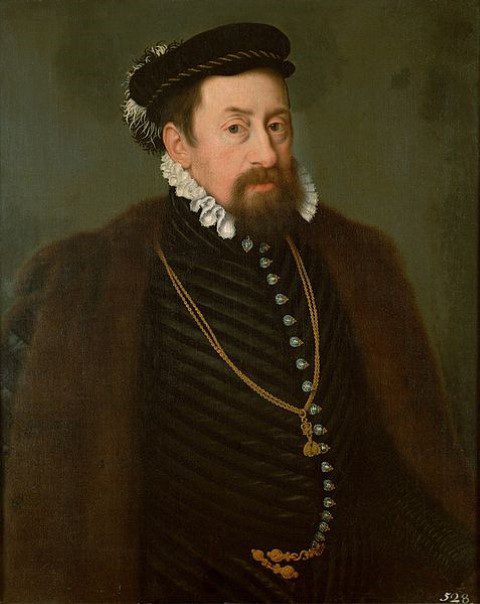Maximilian II (1527–1576) of the House of Habsburg was Holy Roman Emperor as well as king of Bohemia, Croatia, and Hungary.

Kunsthistorisches Museum, Vienna, Austria
The Emperor . . . had long suffered from gout, from heart attacks, from bouts of “kidney colic,” [and] quite possibly syphilis, that had been sweeping across Europe since the turn of the 16th century. His doctors advised him to dilute with water the strong Hungarian wines he loved to drink, in order to relieve the excruciating pains of the gout. . . . On the way [to Regensburg] he was stricken ill—his doctors thought from eating too much fish, though a half-dozen doctors regularly stood by at each meal, watching every mouthful that reached his Imperial Majesty’s mouth. In Regensburg he was ill again—this time, the doctors decided, from eating unripe fruit. He managed to open the diet, to begin on the business of the meeting, when he suddenly fell unconscious—from the ice-cooled wine he had drunk in August, his doctors observed. He grew a little better, only to be taken sick again—from the pears and cherries he had eaten. His doctors were bewildered and dosed him aloes.
He failed to improve; a famous quack of Ulm named Magdalena Streicher brought the miraculous elixir she had concocted for the Emperor to try . . . to Venetian treacle was to be added “a single scruple of tincture of coral, of sapphire, or hyacinth, or a solution of pearls or potable gold,” the whole to be combined with antimony for all diseases curable by sweating.
At first the Emperor seemed to grow better, then he took a grave turn for the worse. . . . He was forty-nine when he died. When the doctors examined his skull after death they found it remarkably dry and warm, which they laid to his variety talents, “the great number of languages that he understood, the knowledge of so many things as well as the cleverness and skill that was so astonishing to everyone.” Other sources declared that a “black substance as hard as stone was found in his heart.”
— From The Habsburgs by Dorothy Gia McGuigan, New York: Doubleday & Company Inc., 1966

Leave a Reply